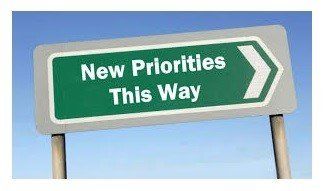How are organisations adapting to the 'new normal'? - Part 5
Richard Frost
June 27, 2020
How do you think leadership in your organisation will need to change?

The Senior HR Network conducted a series of interviews with our extensive network of leaders from a multitude of industries both public and private sector, all above SME level, based nationally and internationally to understand their recent Covid-19 experience. Together we explored what life was like immediately after the announcement of ‘lockdown’, their experience thus far and their current thinking around managing ongoing change, transition and the future state.
We asked: How do you think leadership in your organisation will need to change?
There was a remarkable consistency in the response to this question. When the crisis was in its initial few days, management skills utilising 'command and control' abilities were advantageous, so short-term measures to keep staff safe were actioned quickly.
Once safety measures and initial actions were implemented, the leadership skills required quickly changed. There was a consistent feeling amongst all that the game has irreversibly changed for leaders, certainly for the foreseeable future.
Respondents felt that their organisations had pulled together, and it had been a team effort across all functions.
While, for the obvious reasons, respondents have not enjoyed the last few months, they have stated it has in some ways been an engaging professional experience. An example is that they have seen employees given the opportunity to be more empowered in their roles due to the loosening of managerial control often from not being physically in the same location. Also, there is a feeling that there is no turning back to the new business reality of flexible working. Many respondents felt that COVID-19 had increased the pace of change in these positive areas.
What is the ‘so what?’ from this; and the fundamental changes our interviewees are predicting for leaders:
1. Trust. An essential leadership skill before COVID-19 but it was felt that it would become more critical as teams interact with each other virtually. There is less opportunity to build and maintain relationships when not interacting face-to-face. A suggestion is that leaders should enthusiastically develop themselves to learn the leadership skills of empathy and actively support the devolving of decision making across and down the organisation.
2. Empathy. Is related to the skill of building trust. Examples would be that leaders will need to be empathetic as people return to work. The reactions to COVID-19 amongst teams and leaders have varied enormously, and so leaders will need to manage this with empathy and caring attitudes. This will not be a natural skill for many leaders and may have a lasting effect on processes like the identification of high potentials in the future.
3. Task management, not presentism. The horse has bolted for those leaders who did not approve of their people 'working from home'! This opinion is not only dated but, if it was not before, is now obsolete in the 2020+ workplace. This shift raises the need for leadership skills like trust, empathy, team building and decision making. The feeling is that COVID-19 has accelerated the already identified leadership need for these skills.
4. The logistics of work changing. While you could argue this is an obvious observation, it will be interesting to see how it evolves for companies, teams and individuals. A lot of the interviewees we spoke to were familiar with virtual working and an international business environment and understood travel, for instance, will be minimal for some time. However, the way we work and how we work is an area where organisations will put significant leadership focus ongoing. The potential impact on mental health, wellbeing, team effectiveness are not known, and it could mean a rapid change in how we all work moving forward, it’s not just about what you do but how you do it more now than ever. Respondents recognised these potential changes and were ready to act as the future becomes apparent. This could mean a gradual relaxation of current laws but also further ‘outbreaks’, may require ongoing tightening of work practices. The main observation from the interviewees is that they know it is a fluid situation and remaining vigilant will continue to be necessary.
About the authors
The Senior HR Network was set up to provide senior HR practitioners across the UK and across disciplines to share knowledge, learnings and experiences and expand future thinking in people and organisations.
The Senior HR Network was set up to provide senior HR practitioners across the UK and across disciplines to share knowledge, learnings and experiences and expand future thinking in people and organisations.
Richard Frost, People Perform Consulting Limited
Telephone: 0333 577 1319
Email: Richard@peopleperform.co.uk
Telephone: 0333 577 1319
Email: Richard@peopleperform.co.uk
Andrew Carter, Reward Risk Management Limited
Telephone: 07904439172
Email: andrewc@rewardrisk.co.uk
Telephone: 07904439172
Email: andrewc@rewardrisk.co.uk
Jo Brooks, Aligned HR Services
Telephone: 07788278295
Email: joanna@alignedhrservices.org.uk
Telephone: 07788278295
Email: joanna@alignedhrservices.org.uk
Johanna Hooper, Limitless Peak Performance
Telephone: 07713196730
Email: johanna@limitlesspeakperformance.co.uk
Telephone: 07713196730
Email: johanna@limitlesspeakperformance.co.uk
Kirsty Brooks, People Perform Consulting Limited
Telephone: 0333 577 1319
Email: Kirsty@peopleperform.co.uk
Telephone: 0333 577 1319
Email: Kirsty@peopleperform.co.uk
Tina Jennings, Cosán Cróga Limited
Telephone: 07765 060298
Email: tina@cosancroga.com
Jane Baalam, Reward Risk Management Limited
Telephone: 07415 974004
Email: janebaalam@rewardrisk.co.uk
Telephone: 07765 060298
Email: tina@cosancroga.com
Jane Baalam, Reward Risk Management Limited
Telephone: 07415 974004
Email: janebaalam@rewardrisk.co.uk









